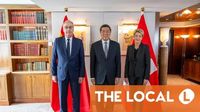On May 9, 2025, the Swiss Market Index edged up by 0.21% as investors anticipated a promising trade deal between Switzerland and the United States. This optimism comes despite global economic signals flashing red, indicating that while the stock market is buoyed by potential positive developments, underlying economic conditions remain concerning.
The Swiss stock market is riding a wave of optimism after positive signals from trade talks with the US, even though there are looming threats of a hefty 31% tariff on Swiss exports. This potential trade deal shines a hopeful light on the market, but it is dimmed by Switzerland's Consumer Sentiment Index dropping to -42.4, reflecting dwindling consumer confidence.
The KOF Swiss Economic Institute has marked a third consecutive month of declining global economic indicators, highlighting the geopolitical tensions that continue to affect markets worldwide. In this context, shares of Georg Fischer climbed nearly 3% following its acquisition of Germany's VAG-Group for 200 million francs, showcasing some individual successes amidst broader market concerns.
Compagnie Financière Richemont remains under scrutiny, with Bank of America expressing concerns over future margins, although the stock saw a slight uptick. The mixed signals from the market underscore the cautious optimism surrounding the potential trade deal.
Switzerland's president, Karin Keller-Sutter, expressed her disappointment over earlier talks with US President Donald Trump's treasury secretary, which did not ease the stiff tariffs on Swiss goods. However, she remains hopeful about the constructive discussions with US Treasury Secretary Scott Bessent and Trade Representative Jamieson Greer aimed at laying out the guidelines for a deal on customs duties. These discussions are set to continue in the coming weeks.
Keller-Sutter noted, "We also would like to accelerate the talks with the US authorities so that we can find a solution very quickly. This is also in the interests of both countries. We are important commercial partners." The urgency of these talks is underscored by the looming threat of tariffs that could significantly impact the Swiss economy.
The upcoming talks between Bessent and Chinese Vice Premier He Lifeng in Geneva provide another opportunity for the Swiss to advocate for a favorable resolution to the tariff situation. These negotiations come at a time when the US administration has temporarily suspended the most severe tariffs against every target country except China, which adds another layer of complexity to the discussions.
During a phone call on April 9, a week after Trump announced the "reciprocal" tariffs package, he spoke with Keller-Sutter and later announced a pause in their implementation for 90 days, capping the additional US tariffs at 10% for most countries, with the notable exception of China. Keller-Sutter expressed her disappointment regarding the lack of progress in earlier talks, stating, "Of course, it is disappointing," but she also emphasized the importance of looking forward rather than dwelling on past negotiations.
Amid these discussions, Keller-Sutter pointed out the significant impact of Swiss investment in the United States, noting that it has created 400,000 jobs with an average salary of $130,000 (€115,000). This statistic highlights the importance of the bilateral relationship between the two nations and serves as a reminder of the stakes involved in the ongoing negotiations.
As the weekend talks approach, the geopolitical landscape remains tense, with the US imposing 145% tariffs on Chinese goods, prompting Beijing to respond with 125% tariffs on US goods. Earlier on May 9, Trump hinted at the possibility of lowering these tariffs sharply, stating, "80% Tariff on China seems right!" This volatile environment adds pressure on Switzerland to secure a favorable outcome in its trade discussions.
Given the size of Switzerland's trade surplus—exporting more to the United States than it imports—the Trump administration's threat to impose a 31% levy on Swiss exports could be catastrophic for major sectors of Switzerland's economy, particularly manufacturing and watchmaking. Currently, the US is imposing a 10% levy on goods coming from Switzerland, but the potential for increased tariffs looms large.
In 2024, the total value of Switzerland's goods exports to the United States was expected to reach 52.65 billion Swiss francs ($63.7 billion), with pharmaceutical products being the largest export. In contrast, imports of goods from the United States were valued at 14.13 billion francs, according to Switzerland's Federal Office for Customs and Border Security. This imbalance underscores the importance of the trade relationship and the potential consequences of tariff increases.
Switzerland ranks as the sixth-largest foreign investor in the United States and leads in research and development, particularly in the pharmaceutical sector. Notably, major Swiss companies like Novartis and Roche have announced significant investments in the United States, with Novartis increasing its investments by $23 billion over five years and Roche planning to invest $50 billion over the same period. These commitments reflect the ongoing importance of the US market for Swiss firms.
As discussions continue, the outcome of the trade negotiations will likely have significant implications for both nations. While the potential for a trade deal brings some optimism to the Swiss stock market, the broader economic landscape remains fraught with uncertainty. Investors are urged to remain vigilant, as geopolitical tensions and declining consumer confidence underscore the vulnerabilities that persist in the market.
The duality of opportunity and threat facing Switzerland within the global economic framework highlights the need for careful navigation of the ongoing trade discussions. As the situation unfolds, all eyes will be on Geneva, where crucial negotiations could reshape the future of Swiss-American trade relations.





